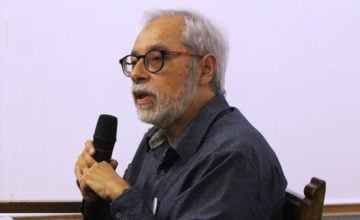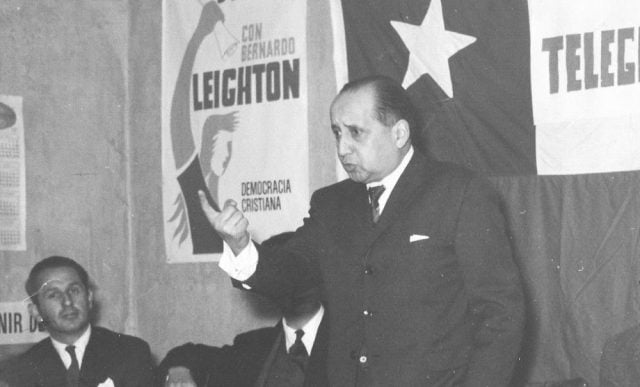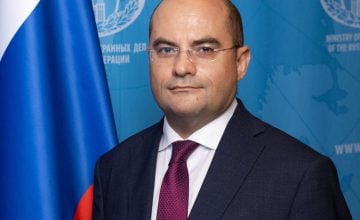In Rome, Italy, we interviewed Lorenzo Tondi, an economist, union leader, and activist with the radical left political organization Potere al Popolo. Our discussion focused on Giorgia Meloni’s government, the characterization of the right-wing parties that have governed Italy, as well as the state of the left and social movements.
By Javier Pineda Olcay, Director of El Ciudadano
Javier Pineda: Lorenzo, thank you very much for this interview. How do you characterize Giorgia Meloni’s government? What analysis does your organization, Potere al Popolo, provide? Can we speak of a fascist, neo-fascist, or authoritarian neoliberal government?
Lorenzo Tondi: We believe that Giorgia Meloni’s government, and Meloni herself, despite having started her career in a neo-fascist party like the Movimento Sociale Italiano, has developed a different political strategy from a more moderate stance within that party. Historically, her role has been to serve as a reference point for capitalists when they needed to ramp up opposition to the rise of the left.
Today, we think that Fratelli d’Italia is not a fascist party, but rather a neoliberal party, fundamentally an authoritarian neoliberal party that advocates a form of neoliberal authoritarianism. There is a key difference between these parties with neo-fascist roots, which are no longer fascist, and others like those of Bolsonaro or Trump, which seek to mobilize and radicalize the masses using methods like religious fundamentalism.
JP: And what is Giorgia Meloni’s relationship with the Catholic Church like?
LT: It is a normal relationship, not particularly intense. Fratelli d’Italia is not characterized as a particularly religious party. There isn’t a strong connection between homeland, religion, and state. Meloni presents herself as a leader of a nationalist and sovereignist party, but religious discourse is not very significant. The phenomenon on which Meloni relies is the «pacification» of the masses, which is precisely the opposite of what Trump and Bolsonaro seek. She promotes a mechanism of delegation: telling people not to worry about change, but simply to delegate power to her to manage everything.
JP: How does this differ from other right-wing governments like those of Berlusconi or Salvini?
LT: There is a sort of continuity, not only with right-wing governments but also with center-left administrations and technical governments, like that of Mario Draghi. Essentially, economic policy has been quite similar. Neoliberalism has been a constant factor over the last 30 years; most laws that liberalized the labor market were passed by center-left governments.
What Meloni does differently from center-left governments is a complete tolerance towards tax evasion and avoidance. Her government claims that tax evasion can be tolerated and has pushed for a regressive tax reform. That is why it is a neoliberal right. When it comes to social and ethical issues, there is a conservative and right-wing rhetoric.
JP: Regarding the rhetoric around the migrant population, what is the difference between the discourse and the effectiveness of those policies?
LT: Meloni’s government utilizes very aggressive rhetoric against immigrants, but this has not been accompanied by effective measures. One example is her plan to externalize detention camps. The idea was to set up a camp in Albania, creating an «extraterritorial solution,» but it has been a total failure. From an efficacy standpoint, it is madness: the cost of moving and maintaining immigrants there is enormous. Currently, that camp in Albania houses barely 30 people and has had around 130 people pass through it, of whom 32 have been repatriated. Furthermore, the policy against undocumented immigration, including the creation of these camps, began with the Turco-Napolitano law, promoted by a center-left government, reinforcing continuity.
JP: Regarding Meloni’s sovereignist position, how has it played out in the European Union and her relationship with NATO?
LT: We need to differentiate between Giorgia Meloni and Matteo Salvini. Salvini has a more aggressive and pro-Russian stance. In contrast, Meloni, whose party was originally Eurosceptic, has now fully integrated into the European mainstream. She engages and governs alongside other conservative and social-democratic parties in the EU, acting with external support within the grand coalition. In the intergovernmental arena, she fits perfectly within the EU framework.
As for NATO, today Italy is one of the most Atlantist countries. Meloni has maintained a position very loyal to the decisions being made in Brussels and Washington. The Italian government’s stance is one of unconditional support for NATO policy.
JP: Analyzing the opposition sectors, what political and social actors can we distinguish? What has happened to the Democratic Party and the Five Star Movement? And what project does Potere al Popolo represent?
LT: We can divide the opposition into two fields. First, the center-left or moderate left field. The most important party is the Democratic Party, which, ironically, being the heir of the Italian Communist Party, has pushed numerous neoliberal reforms in recent decades. Then there is the Five Star Movement, a populist party that has lost its anti-system protest character by allying with the Democratic Party. Additionally, there is Alleanza Verde e Sinistra, a social-democratic party that always ends up aligning with the Democratic Party.
The second field is that of the radical left. Here we find Potere al Popolo, alongside other parties like the Partito Rifondazione Comunista. We at Potere al Popolo believe we are playing a very important role. Our general objective is to organize struggles in the territory and provide them with a general and strategic perspective to build new political-social representation for the working classes. We believe that constructing an alternative field to that of the center-left is necessary to also rebuild popular representation within institutions, which has been lost since the 2008 elections. This reconstruction is crucial because the center-left represents merely a faction of the power that has governed Italy thus far.
JP: At the level of social movements, besides solidarity with Palestine, what other actors are important?
LT: Naturally, there are unions, particularly the more combative ones like USB (Base Union Confederation), which was one of the actors behind the massive general strike on September 22. There are also migrant movements seeking to change immigration laws to create legal access channels. Moreover, the women’s movement against gender violence has become significant in recent years due to a persistent and severe problem of machismo violence, often normalized by the media. Additionally, there is the student and youth movement, which is part of our social bloc and, contrary to the dominant rhetoric, is far from apathetic and passive; in fact, it has been the most active actor during these decades of Italian «social peace.
JP: When are the next elections and what are the likely results in terms of electoral strength?
LT: The next national elections will be in 2027. Recently, in regional elections in Calabria and Tuscany, there has been a noticeable trend of progressively high abstention rates. In Tuscany, Potere al Popolo presented the “Toscana Roja” list, which received 4.5% of the votes, narrowly missing the 5% threshold. It was a positive result compared to our historical performance. Upcoming elections will be held in Campania, where one of our spokespersons is a candidate, representing a good opportunity to continue our roots in society. We have until 2027 to strengthen ourselves and attempt to play an important role.








